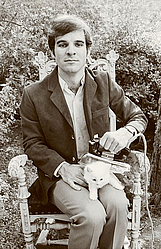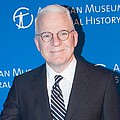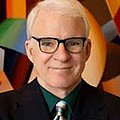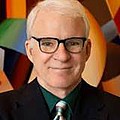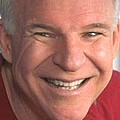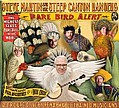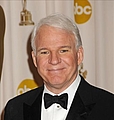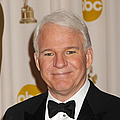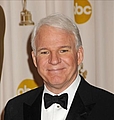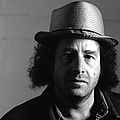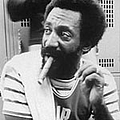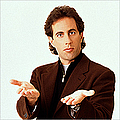Steve Martin Biography
Stephen Glenn Martin (born August 14, 1945) is an American comedian, writer, producer, actor, musician and composer. Biography Early years Steve Martin was born in Waco, Texas to Glenn Vernon Martin, a real estate salesman and aspiring actor and Mary Lee Stewart, a housewife. Martin was raised in Garden Grove, California and is of English, Scottish and Irish descent.[1] As a teenager, Martin started out working at the Magic Shop at Disneyland, where he developed his talents for magic, juggling, playing the banjo and creating balloon animals. He teamed up with friend and Garden Grove High School classmate Kathy Westmoreland to do a musical comedy routine, performing at local coffee houses and at the Bird Cage Theater in Knott's Berry Farm. Martin majored in philosophy at California State University at Long Beach, and for a while, considered becoming a philosophy professor instead of an actor-comedian. In 1967, he transferred to UCLA and switched his major to theater. Martin soon began working local clubs at night, to mixed notices. At the age of twenty-one, he dropped out of college for good.[2] Martin periodically spoofed his philosophy studies in his 1970s stand-up act, comparing philosophy with studying geology. "If you're studying geology, which is all facts, as soon as you get out of school you forget it all, but philosophy you remember just enough to screw you up for the rest of your life."[3] While attending college, he appeared in an episode of The Dating Game. Nevertheless, his time there changed his life: "It changed what I believe and what I think about everything. I majored in philosophy. Something about non sequiturs appealed to me. In philosophy, I started studying logic, and they were talking about cause and effect, and you start to realize, 'Hey, there is no cause and effect! There is no logic! There is no anything!' Then it gets real easy to write this stuff, because all you have to do is twist everything hard—you twist the punch line, you twist the non sequitur so hard away from the things that set it up, that it's easy... and it's thrilling."[4] Martin's girlfriend in 1967 was a dancer on The Smothers Brothers Comedy Hour. She helped Martin land a writing job with the show by submitting his work to head writer Mason Williams. Williams initially paid Martin out of his own pocket. Along with the other writers for the show, Martin won an Emmy Award in 1969. Martin also wrote for John Denver (a neighbor of his in Aspen, Colorado at one point), The Glen Campbell Goodtime Hour, and The Sonny and Cher Comedy Hour. He also appeared on these shows and several others, in various comedy skits. Martin also performed his own material, sometimes as an opening act for groups such as The Nitty Gritty Dirt Band and The Carpenters. He appeared at San Francisco's The Boarding House, among other venues. He continued to write, earning an Emmy nomination for his work on Van Dyke and Company in 1976. Fame In the mid-1970s, Martin made frequent appearances as a stand-up comedian on The Tonight Show Starring Johnny Carson. That exposure, together with appearances on HBO's On Location and NBC's Saturday Night Live (SNL) (on which, despite a common misconception, he was never a cast member) led to his first of four comedy albums, Let's Get Small. The album was a huge success; one of its tracks, Excuse Me, helped establish a national catch phrase. His next album, A Wild and Crazy Guy, was an even bigger success, reaching the #2 spot on the sales chart in the U.S. and featured another catch phrase (the album's title), this time based on a Saturday Night Live sketch in which Martin and Dan Aykroyd played a couple of bumbling Czechoslovakian would-be playboys, the Festrunk Brothers. The album ended with a song "King Tut", sung and written by Martin and released as a 45 RPM single during the King Tut craze that accompanied the extremely popular travelling exhibit of the Egyptian king's tomb artifacts; the single reached the top 40 in 1978. The song was backed by the "Toot Uncommons" (they were actually members of the Nitty Gritty Dirt Band). The album was a million seller. Both albums won Grammys for Best Comedy Recording in 1977 and 1978, respectively. In his comedy albums, Martin's stand-up comedy was clearly self-referential and sometimes self-mocking. It mixes philosophical riffs with sudden spurts of "happy feet", deft banjo playing with balloon depictions of concepts like venereal disease. His style is off-kilter and ironic and sometimes pokes fun at stand-up comedy traditions. A typical gag might be interrupted for a sip from a glass of water and just as he was about to speak again, he forcefully spits the water onto the floor. Movie career By the end of the 1970s, Steve Martin, as a wild and crazy comedian, had acquired the kind of following normally reserved for rock stars, with his tour appearances typically occurring at sold-out arenas filled with tens of thousands of screaming fans. But unknown to his audience, stand-up comedy was "just an accident" for him. His real goal was to get into film.[4] Martin's first film was a short, The Absent-Minded Waiter (1977). The seven-minute long film, also featuring Buck Henry and Teri Garr, was written by and starred Martin. The film was nominated for an Academy Award as Best Short Film, Live Action. His first feature film appearance was in the musical Sgt. Pepper's Lonely Hearts Club Band, where he sang the Beatles' "Maxwell's Silver Hammer". In 1979, Martin wrote and starred in his first full-length movie, The Jerk, directed by Carl Reiner. The movie was a huge success, grossing over $73 million on a budget of far less than that amount.[5] The success of The Jerk opened more doors for Martin. Stanley Kubrick met with him to discuss the possibility of Martin starring in a screwball comedy version of Traumnovelle (Kubrick later changed his approach to the material, the result of which was 1999's Eyes Wide Shut). Martin was executive producer for Domestic Life, a prime-time television series starring Martin Mull, and a late-night series called Twilight Theater. It emboldened Martin to try his hand at his first serious film, Pennies From Heaven, a movie he was anxious to do because of the desire to avoid being typecast. To prepare for that film, Martin took acting lessons from the director, Herbert Ross and spent months learning how to tap dance. The film was a financial failure; Martin's comment at the time was "I don't know what to blame, other than it's me and not a comedy." Martin was in three more Reiner-directed comedies after The Jerk: Dead Men Don't Wear Plaid in 1982, The Man with Two Brains in 1983 and All of Me in 1984, which remains perhaps the most critically lauded performance of his career. In 1986, Martin joined fellow Saturday Night Live veterans Martin Short and Chevy Chase in ¡Three Amigos!, directed by John Landis, and written by Martin, Lorne Michaels, and Randy Newman. It was originally entitled The Three Caballeros and Martin was to be teamed with Dan Aykroyd and John Belushi. In 1986, Martin was in the musical film version of the hit off-Broadway play Little Shop of Horrors (based on a famous B-movie), as a sadistic dentist, Orin Scrivello. The film also marked the first of three films teaming Martin with actor Rick Moranis. In 1987, Martin joined comedian John Candy in the John Hughes movie, Planes, Trains & Automobiles. That same year, the Cyrano de Bergerac adaptation Roxanne, a film Martin co-wrote, won him a Writers Guild of America award and more importantly, the recognition from Hollywood and the public that he was more than a comedian. In 1988, he did Dirty Rotten Scoundrels acting alongside Michael Caine and directed by Frank Oz. Martin starred in the Ron Howard film, Parenthood, with Rick Moranis in 1989. He later met with Moranis to make the mob comedy My Blue Heaven in 1990. In 1991, Martin starred in and wrote L.A. Story and was a member of the ensemble existentialist tragedy Grand Canyon that were both about life in Los Angeles. In a serious role, Martin played a tightly wound Hollywood film producer trying to recover from a traumatic robbery that left him injured. In David Mamet's 1997 thriller, The Spanish Prisoner, Martin played a darker role as a wealthy stranger who takes a suspicious interest in the work of a young businessman (Campbell Scott). In 1999, Martin and Goldie Hawn starred in a remake of the 1970 Neil Simon comedy, The Out-of-Towners. 2003 had Steve Martin ranked 4th on the box office stars list, after co-starring in Bringing Down The House and starring in Cheaper By The Dozen, each of which earned over $130 million at U.S. theaters. Both were family comedies. In 2005, Martin wrote and starred in Shopgirl, based on his own novella. Martin played a wealthy businessman who strikes up a romance with a Saks 5th Avenue counter girl (Claire Danes). He also starred in Cheaper by the Dozen 2 that year. Martin's latest work was in the 2006 installment of The Pink Panther, starring as the bumbling Inspector Clouseau. He will be lending his voice for DreamWorks Animation's upcoming film Kung Fu Panda along with Jack Black, Ian McShane, Dustin Hoffman, Jackie Chan, Daniel Craig and Lucy Liu. Other work Throughout the 1990s, after Tina Brown took over The New Yorker, Martin wrote various pieces for the magazine. They later appeared in the collection Pure Drivel. He appeared in a version of Waiting for Godot as Vladimir (with Robin Williams as Estragon). In 1993, Martin wrote the play Picasso at the Lapin Agile, which had a successful run in several American cities. In 1998, Martin guest starred on an episode of The Simpsons titled Trash of the Titans, providing the voice for sanitation commissioner Ray Patterson. In 2001, Martin hosted the 73rd Annual Academy Awards. Also in 2001, he played banjo on Earl Scruggs' remake of "Foggy Mountain Breakdown". Martin called fellow comedian and banjo player Billy Connolly to tell him, prompting the cry of "you lucky bugger!!" Connolly's wife thought he was referring to Martin being chosen as the Oscar's host. The recording was the winner of the Best Country Instrumental Performance category at the following year's Grammys. In 2002, Martin adapted the Carl Sternheim play The Underpants, which ran Off-Broadway at Classic Stage Company. In 2003, Martin hosted the Academy Awards for the second time. In 2005, Martin hosted a film along with Donald Duck, Disneyland: The First 50 Magical Years, which showed at Disneyland until the end of Disneyland's 50th anniversary celebration in September 2006. Martin was also honoured in 2005 with a Disney Legend award, acknowledging Martin's early career at Disneyland and connections with The Walt Disney Company throughout his career. Martin has guest-hosted Saturday Night Live 14 times, more than any other person. He is one of the few hosts to have a "Best of" compilation DVD of his skits, along with Tom Hanks, Alec Baldwin (who with 13 appearences is the closest person to beat Martin's record), and Christopher Walken. Martin has also written two novellas, Shopgirl and The Pleasure of My Company. Shopgirl was later turned into a film (see above). In a 2005 poll to find The Comedian's Comedian, Martin was voted one of the top 15 greatest comedy acts ever by fellow comedians and comedy insiders. On October 23, 2005, Martin was presented with the Mark Twain Prize for American Humor. Early in Martin's career he developed a character entitled "The Great Flydini". This magician would produce eggs and light candles from his open zipper found on his dress slacks. Even an opera singing hand puppet would make an appearance. Much of Steve Martin's comedy styling would be influenced by the actor, comedian, magician Carl Ballantine. Carl performed at the opening of Disneyland and young Steve Martin would watch his performances closely. Art collection Martin is an avid art collector, particularly modern American art, and a trustee of the Los Angeles County Museum of Art. Martin's personal collection has at one time included the art of Georgia O'Keeffe, John Henry Twachtman, Richard Diebenkorn, Po Shun Leong, Willem de Kooning, Franz Kline, Cy Twombly, Helen Frankenthaler, Edward Hopper, David Hockney, Roy Lichtenstein and Pablo Picasso. In 2005, The Huntington Library in San Marino, California announced that Martin had pledged US$1 million over five years for the museum's American art collection.[6] Three-quarters of the gift will be used for exhibitions, with the remainder being used for acquisitions. Before he made his pledge, Martin loaned paintings to the museum, helped it acquire a sculpture by John Gregory, and sponsored an exhibition of "sugar paintings" by 19th century American artist Eastman Johnson. Jessica Todd Smith, the museum's American art curator, said Martin became an "enthusiastic" supporter of The Huntington after he visited the museum in 2002 while filming a movie nearby. Filmography * The Absent-Minded Waiter (1977) (short subject) * Sgt. Pepper's Lonely Hearts Club Band (1978) * The Muppet Movie (1979) * The Kids Are Alright (1979) (documentary) * The Jerk (1979) (also writer) * Pennies from Heaven (1981) * Dead Men Don't Wear Plaid (1982) (also writer) * The Man with Two Brains (1983) (also writer) * The Lonely Guy (1984) * All of Me (1984) * Movers & Shakers (1985) * ¡Three Amigos! (1986) (also writer and executive producer) * Little Shop of Horrors (1986) * Roxanne (1987) (also writer and executive producer) * Planes, Trains & Automobiles (1987) * Dirty Rotten Scoundrels (1988) * Parenthood (1989) * My Blue Heaven (1990) * L.A. Story (1991) (also writer and executive producer) * Father of the Bride (1991) * Grand Canyon (1991) * HouseSitter (1992) * Leap of Faith (1992) * A Simple Twist of Fate (1994) (also writer and executive producer) * Mixed Nuts (1994) * Father of the Bride Part II (1995) * Sgt. Bilko (1996) * The Spanish Prisoner (1997) * The Prince of Egypt (1998) (voice: Hotep) * The Out-of-Towners (1999) * Bowfinger (1999) (also writer) * The Venice Project (1999) (Cameo) * Fantasia 2000 (1999) * Thin Ice (2000) * Joe Gould's Secret (2000) * Novocaine (2001) * Bringing Down the House (2003) * Looney Tunes: Back in Action (2003) * Cheaper by the Dozen (2003) * Jiminy Glick in Lalawood (2004) (Cameo) * Shopgirl (2005) (also writer and producer) * Cheaper by the Dozen 2 (2005) * The Pink Panther (2006) (A reboot of the earlier series) * The Pink Panther 2 (2008) (officially announced by MGM) Bibliography * Cruel Shoes (1979) * Picasso at the Lapin Agile and Other Plays: Picasso at the Lapin Agile, the Zig-Zag Woman, Patter for the Floating Lady, Wasp (1996) * L.A. Story and Roxanne: Two Screenplays (published together in 1997) * Pure Drivel (1998) * Shopgirl (2001) * The Underpants: A Play (2002) * The Pleasure of My Company (2003) Discography * Let's Get Small (1977) * King Tut (1978, 45 RPM music single) * A Wild and Crazy Guy (1978) * Comedy is Not Pretty! (1979) * The Steve Martin Brothers (1981)
Top Steve Martin Lyrics
Write a comment
What do you think about Steve Martin? Let us know in the comments below!
Steve Martin News & events
Steve Martin Albums
| Title | Release | ||
|---|---|---|---|
| 1 | Comedy Is Not Pretty! | ||
| 2 | Let's Get Small | 1995 | |
| 3 | A Wild and Crazy Guy | 1989 | |
| 4 | The Crow | 2009 | |
| 5 | Rare Bird Alert | 2011 | |
| 6 | Love Has Come For You |
